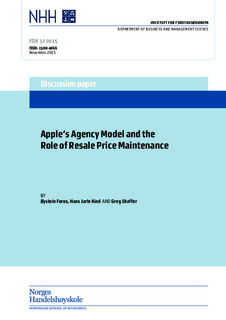| dc.contributor.author | Foros, Øystein | |
| dc.contributor.author | Kind, Hans Jarle | |
| dc.contributor.author | Shaffer, Greg | |
| dc.date.accessioned | 2015-11-27T10:01:55Z | |
| dc.date.available | 2015-11-27T10:01:55Z | |
| dc.date.issued | 2015-11-27 | |
| dc.identifier.issn | 1500-4066 | |
| dc.identifier.uri | http://hdl.handle.net/11250/2365932 | |
| dc.description.abstract | The agency model is a business format used by online digital platform providers (such as Apple and Google) in which retail pricing decisions are delegated to upstream content providers subject to a fixed revenue-sharing rule. In a non-cooperative setting with competition both upstream and downstream, we show that the agency model can lead to higher or lower retail prices depending on the firms' revenue-sharing splits and the relative substitution between goods and between platforms. Even if industry-wide adoption of the agency model would lead to higher profits for all firms, there may be equilibria in which it is not universally adopted. Most-favored-nation clauses (used by Apple in the controversial e-books case) can be used in such settings to increase retail prices and induce adoption. | nb_NO |
| dc.language.iso | eng | nb_NO |
| dc.publisher | FOR | nb_NO |
| dc.relation.ispartofseries | Discussion paper;32/15 | |
| dc.subject | Resale price maintenance | nb_NO |
| dc.subject | interlocking relationships | nb_NO |
| dc.subject | revenue sharing | nb_NO |
| dc.title | Apple's Agency Model and the Role of Resale Price Maintenance | nb_NO |
| dc.type | Working paper | nb_NO |
